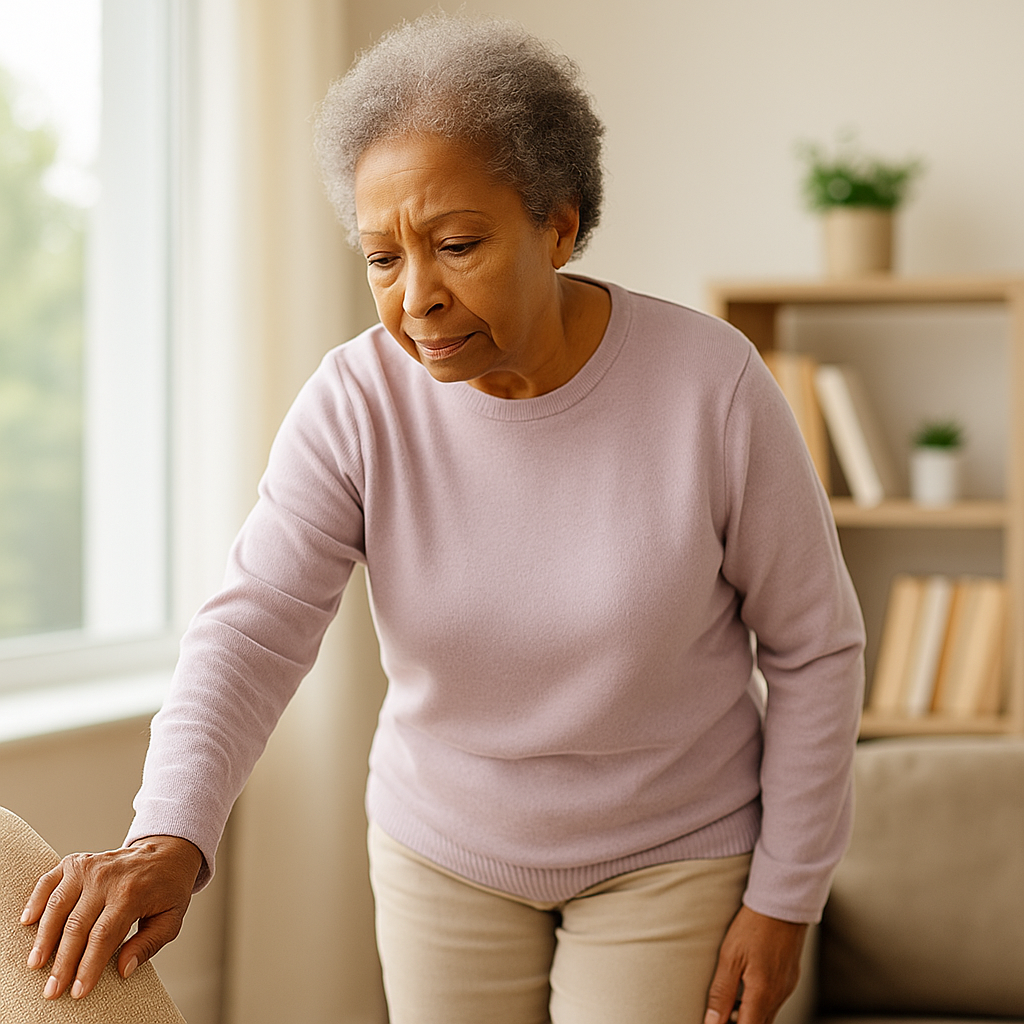A Gentle Guide to Awareness, Prevention, and Peace of Mind
Learn how to recognizing changes early signs before they escalate. Discover strategies to identify small shifts in health, behavior, or daily life early. Our bodies have quiet ways of speaking to us — a little more stiffness in the morning, an unsteady step on the porch, or a forgotten handrail while turning a corner. These small shifts may seem harmless, but for older adults, they’re often the first hints that something deeper needs attention.
Recognizing these early changes doesn’t mean expecting the worst. It means listening, adjusting, and acting before small issues grow into major setbacks. For seniors and caregivers alike, early awareness is the single most powerful tool for maintaining independence, mobility, and confidence.
💬 Paying attention isn’t fear — it’s care in its most powerful form.
Why Recognizing Changes Early Matters
It’s easy to brush off small warning signs — a stumble here, a forgotten appointment there — as “just part of getting older.” But behind those moments, the body may be signaling for help.
Early recognition matters because it:
- Prevents falls and hospital visits through quick intervention.
- Allows medical conditions to be treated before they progress.
- Helps caregivers make safer home adjustments.
- Builds self-awareness and confidence rather than fear.
When you notice change early, you give yourself time — time to adapt, strengthen, and stay independent.
🌿 It’s not about age — it’s about staying aware.
Physical Changes That Shouldn’t Be Ignored
Physical changes are usually the first to appear. They’re subtle, gradual, and often dismissed until a major fall or injury happens. Paying attention to these small clues can make all the difference.
Balance and Movement
- Taking smaller steps or shuffling the feet when walking.
- Reaching for walls or furniture to steady yourself.
- Difficulty turning corners or walking on uneven ground.
- Feeling light-headed or dizzy when standing up.
Strength and Endurance
- Fatigue after simple activities like bathing or cooking.
- Difficulty getting out of chairs or cars without pushing with your arms.
- Muscle weakness that appears on one side more than the other.
Flexibility and Coordination
- Trouble bending, stretching, or picking up small items.
- Stiff joints, especially in the hips, knees, or ankles.
- Slower reaction time when catching balance after a misstep.
Small shifts like these often appear weeks or months before a major event. They’re not signs of failure — they’re reminders to strengthen and adjust routines while you can still do so comfortably.
Emotional and Behavioral Clues
Not every change is physical. Sometimes the body is capable, but confidence takes a step back. After a close call or a small stumble, fear can quietly grow.
What to Watch For
- Avoiding stairs, showers, or favorite walking paths.
- Declining invitations or social events due to fear of falling.
- Becoming quieter, more anxious, or withdrawn.
- Hesitating before standing or walking, even on familiar ground.
When fear replaces freedom, it’s time to act. Gentle reassurance, structured exercises, and open conversation can break the cycle and restore confidence.
💛 Your body follows your mindset — strengthen both.
Subtle Cognitive and Health-Related Changes
Sometimes early warning signs come from the mind, not the muscles. Mental and sensory changes can directly affect balance, awareness, and safety.
Warning Signs Worth Discussing
- Forgetting to use a cane or walker.
- Missing medication doses or meals.
- Difficulty following routines or directions.
- A sudden drop in alertness or motivation.
These changes might stem from medication side effects, dehydration, or an undiagnosed medical condition. A quick check-in with a doctor can uncover simple causes that are easily corrected.
🧠 Catching cognitive changes early protects both mind and body.
The Caregiver’s Perspective
Caregivers often see what their loved ones don’t — a new bruise, slower movements, or quiet hesitation. These small details can reveal early decline long before a crisis.
What Caregivers Often Notice First
- Fingerprints on walls or doorframes from extra support.
- Worn spots on shoes or slippers from uneven walking.
- More laundry or bedding from small spills or nighttime accidents.
- Subtle changes in mood, conversation, or posture.
Keeping a simple notebook or digital log helps track patterns over time. If you notice consistent issues, bring your notes to the next medical appointment — it helps professionals see the full picture.
🤝 Caregiving isn’t just helping — it’s observing with compassion.
Using Smart Tools for Awareness
Modern technology can quietly assist without feeling intrusive. You don’t need complicated gadgets; even simple tools make a big difference.
Helpful Devices for Everyday Monitoring
- Smartwatches and fitness trackers: Record steps, heart rate, and sleep.
- Fall-alert pendants or watches: Automatically notify caregivers during an emergency.
- Motion sensors: Track movement patterns and send alerts if activity drops.
- Medication reminder apps: Help prevent dizziness from missed doses.
- Voice-controlled assistants: Allow seniors to call for help hands-free.
⚙️ Smart technology doesn’t replace care — it enhances it.
When and How to Talk About Change
Bringing up health concerns can be delicate. Many seniors fear losing independence, while caregivers worry about overstepping. The best conversations are calm, respectful, and framed around safety — not decline.
Tips for Productive, Gentle Conversations
- Use “I” statements: “I’ve noticed you seem more tired — can we talk about it?”
- Focus on empowerment: “Let’s find ways to make things easier, not limit you.”
- Bring practical suggestions, not criticism: “Would new shoes or a handrail help?”
- Listen first, advise second.
The goal isn’t control — it’s collaboration. When seniors feel heard, they’re more likely to accept adjustments that protect their independence.
The Role of Family and Loved Ones
Awareness works best as a shared effort. Family members often spot early warning signs during visits, phone calls, or routine check-ins.
Encourage open communication by:
- Checking in regularly about how daily activities feel.
- Offering help with home safety updates.
- Asking respectful questions about comfort or confidence.
- Sharing small victories to celebrate progress.
🌸 Support feels lighter when it’s shared.
How Early Recognition Prevents Hospitalization
Early detection doesn’t just protect health — it saves time, stress, and money.
According to fall-prevention studies, more than half of senior fall injuries could be avoided through earlier intervention.
When you recognize warning signs early, you can:
- Schedule physical therapy before muscles weaken.
- Adjust medications before dizziness sets in.
- Fix lighting or flooring before a dangerous fall.
- Prevent depression or isolation from reduced mobility.
💡 The best hospital visit is the one you never need.
💡 People Also Ask
What are the first signs that a senior might be losing balance?
Early signs include shorter steps, slower walking speed, or frequent use of walls and furniture for support. These subtle changes often appear weeks before a fall risk becomes serious.
How do I talk to my parent about safety without making them feel old?
Use gentle language that focuses on teamwork. Try saying, “Let’s make a few updates to keep you comfortable,” instead of, “You might fall.” Approach it as partnership, not protection.
When should an older adult start physical therapy?
Physical therapy isn’t just for recovery — it’s for prevention. If balance, strength, or flexibility begins to change, even slightly, that’s the perfect time to start a personalized program.
How can seniors track their own mobility or energy levels?
Keeping a small daily notebook or using a smartwatch helps seniors notice shifts in steps, energy, or confidence. Tracking patterns over time makes it easier to spot small changes early.
What’s the best way for caregivers to monitor changes discreetly?
Observe quietly during everyday routines. Look for fatigue, slower movements, or changes in walking posture. Gentle questions and encouragement are more effective than frequent reminders.
Can early awareness really prevent hospital visits?
Yes. Most hospitalizations linked to falls or weakness start with small overlooked signs. By catching them early — and adjusting exercise, lighting, or medication — many can be avoided entirely.
The Gift of Awareness
Recognizing change early is one of the greatest acts of self-care.
It’s not about fearing what might happen — it’s about ensuring you keep doing what you love.
Each small adjustment, whether it’s a new routine, safer shoes, or a balance exercise, gives back control over daily life.
🌿 Awareness builds confidence — and confidence protects independence.
Recommended Reading
- Preventing Falls & Injuries: Everyday habits that lower your risk.
- Physical Therapy for Strength and Balance: Rebuild confidence safely.
- When to Talk to a Professional: How to ask for help before problems grow.
Frequently Asked Questions
1. Why is it important to recognize small changes early?
Catching small shifts in balance, mood, or energy helps prevent falls and bigger health problems later. Early awareness allows seniors and caregivers to make gentle adjustments before an emergency happens.
2. What early signs should seniors and caregivers watch for?
Watch for shorter steps, dizziness, new bruises, or hesitation when walking. Emotional signs like fear of falling or withdrawal from activities can also indicate it’s time for support.
3. How can caregivers bring up changes without causing worry?
Use calm, positive language focused on teamwork — for example, “I noticed you’ve been moving a little slower lately. Let’s talk about how to make things easier.” This builds trust instead of fear.
4. Are minor balance issues normal with age?
Small balance changes are common, but they should never be ignored. Often they’re caused by correctable factors such as medication side effects, dehydration, or muscle weakness that therapy or exercise can improve.
5. What should seniors do if changes seem sudden or unusual?
If new dizziness, confusion, or weakness appears suddenly, contact a healthcare provider right away. Quick medical checks can rule out infections, medication interactions, or underlying conditions.
6. Can technology help notice early health changes?
Yes. Smartwatches, home sensors, and medication reminders can track patterns and alert caregivers to sudden changes. These tools quietly support safety without reducing independence.





